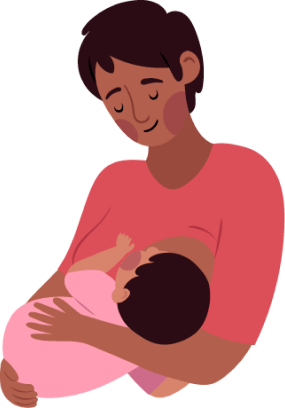Sometimes, the mother’s clothes cover the baby’s face and it gets difficult for the baby to latch on to the mother’s breast. To eradicate this issue, some mothers use hair clips or rubber bands to keep their clothes back. It takes time to find comfortable breastfeeding positions for both mother and baby.


From 5 or 6 months (until his baby teeth start coming in)
You should get the baby used to using a toothbrush from an early age. It is better to massage the baby’s gums twice a day even when the baby’s teeth haven’t started coming in. Massage the baby’s gums for about five seconds on each side with a baby brush.
From 6 or 7 months (front teeth have started coming in)
This is the time to start using toothpaste. Keep brushing the baby’s teeth twice a day so that he gets used to it. You should brush each one of the baby’s teeth in an up-down motion. Wipe the baby’s teeth after finishing with a wet tissue. It is really important to make the baby realize that brushing teeth is a fun thing by having fun while doing it in front of him.
18 months (molars have started coming in)
By this time, molars start to come in. Cavities start to develop quickly as well so you should make sure to brush the baby’s teeth twice a day and for one minute. Don’t forget to brush the teeth before going to bed. Take out accumulated build-ups from the baby’s molars using the tip of the toothbrush.
The development of a baby’s hand movements starts with a palm grip and then comes finger grip and pen grip. The baby won’t be able to use a fork but he will first learn to grasp a spoon. The baby will develop the skill of eating by himself once he learns to use both his hands and lips and once his hand and mouth start working in harmony.
It will take some time for the baby to be able to use his hands properly or chew food easily. However, it will happen bit by bit so stick around and let him play with the food a bit.
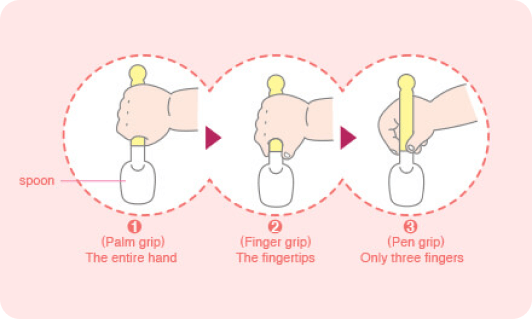
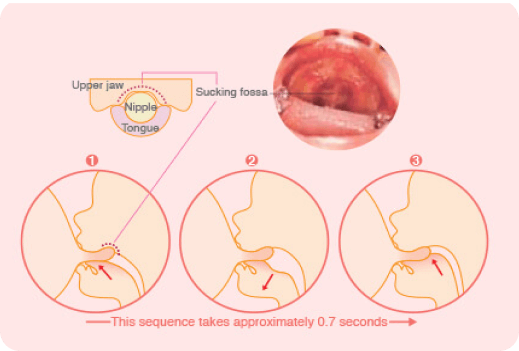
Babies use a suckling motion which is also called peristaltic motion and they use their tongue in a wave-like motion to take out milk. This is really not sucking but a complex action in which the baby pulls the nipple against the sucking fossa and also performs complex actions and extracts the milk. A baby usually takes 10-15 minutes at a time for breastfeeding. This does two things specifically, it helps the baby grow as well as make you realize the power of life.
- The baby has his mouth wide open.
- The baby’s chin is touching the breast.
- The baby’s lower lip is curled outward.
- The baby suckles, pauses, and then suckles slowly.
- The mother might hear the sound of the baby swallowing.

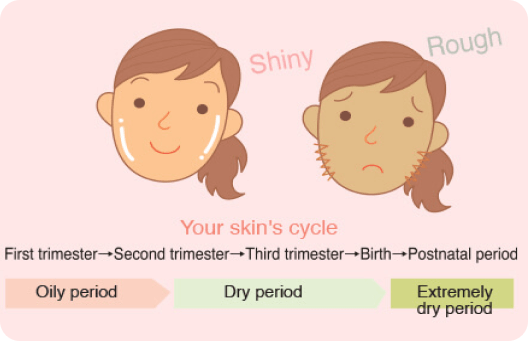
You might feel changes in your skin during pregnancy. Hormone imbalances are a common occurrence and skin loses its ability to revitalize. You should follow an effective skincare routine to be able to protect yourself.
In the earlier stages, the most important tasks for hands are to grasp, operate, and recognize. Touching the mother’s face to clinch the breast, pulling and twisting toys are the functions that are developed over time.
A baby’s developing hands is a prerequisite to developing the brain. Brain development and hand development are interconnected.
Baby’s toys should ideally be the ones that can stimulate interest and fulfill the baby’s desire to play as well as make them learn. Toys must be clean and you should switch between toys, hand playing with you or by himself so that he can develop intellect.
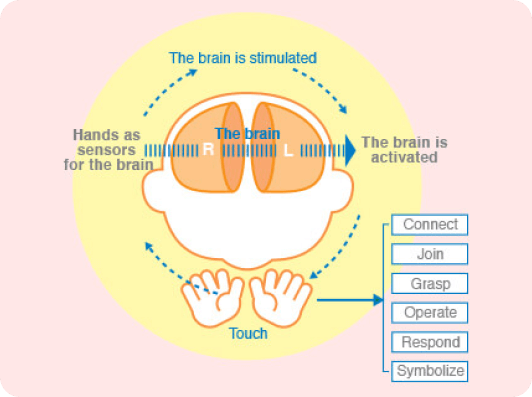

It is a better idea to talk to the older child about the coming baby if he can speak. The reason is that when the new baby comes and he is getting all the care and breastfeeding, the older child might feel a bit jealous so it is a good idea to get him used to other babies so that it’s easier for him to accept the new baby.
Pregnancy causes your abdomen to get bigger and as a result, your skin stretches to put up with this growth. This extensive stretching of the tissue causes marks, generally termed as stretch marks. Stretch marks are those purplish-red lines that you see around your abdominal area. You might not like them but they are an indication that the baby is growing well so they’re not all bad.
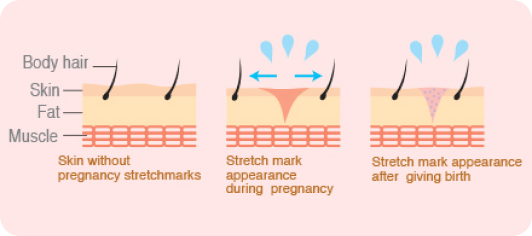
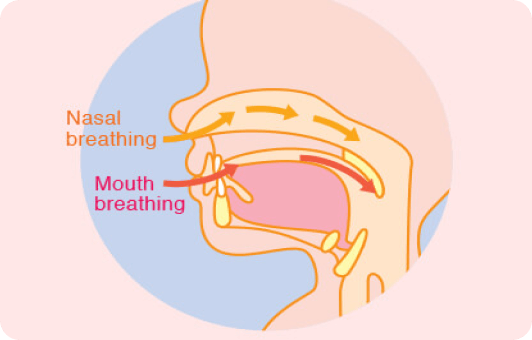
Breathing through the mouth is very common and is unique to humans. However, the mouth is not meant to breathe in so it doesn’t have the mechanism needed to clear out the dust, bacteria, etc. So, if one continues to breathe using their mouth, it will make the mouth dry out and infections might occur.
Breathing through the nose helps in building immunity. That is why the baby should start breathing through the nose and you should train the baby for it using a pacifier.
When the baby starts eating and speaking, there is a chance that they might forget to breathe through the nose, it is really important to train the baby for nose breathing.
Babies use their toes to try and balance themselves. Adults put their weight on heels and then shift it to the toes through the sole. Unlike adults, babies cannot perform this action yet.
Babies use the entire foot to walk in the beginning, just like a board they lift their whole foot and place it on the floor in a pitter-patter manner. The big toe moves upwards while the small toe moves down and outwards, this makes the baby learn how to balance the weight.
Use shoes having some room for the baby’s toes so he can move them freely. Moreover, it’s a part of the development process so don’t stress about it too much and watch the baby at ease.
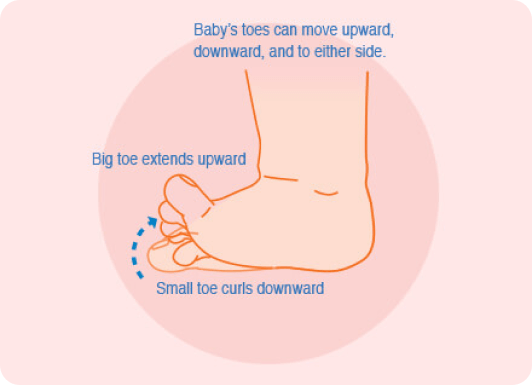
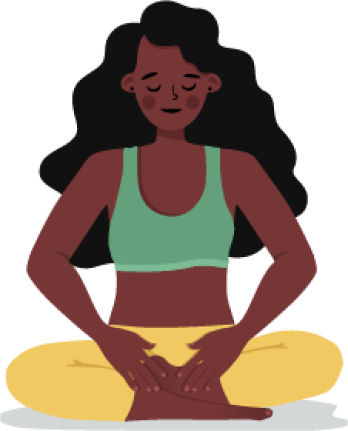
Pregnant women have to endure morning sickness. It might make you feel nauseous, lose your appetite, or you might even feel like vomiting.
The reason behind morning sickness is found to be hormonal imbalance because of pregnancy. However, be sure to see a doctor if you are facing difficulty putting up with it.
Babies inside their mother’s womb do not need too much nutrition so don’t stress about it. Just eat as much as you like and rest as much as you can.
Vomiting causes dehydration so you need to drink a lot of water. Drink as much as possible even with breaks.
The hormone levels decrease exponentially right after the delivery, that is why you will find yourself crying for no reason and wild mood swings will come with it. This is termed postpartum depression. It doesn’t last long and it will go away in approximately a month. However, if it doesn’t go away in a few months, you better consult a doctor.
You will also feel down physically and you’ll feel tired because pregnancy tires you physically. Moreover, you are not used to taking care of the baby full time so it takes a toll on newer mothers. You should not cope up with it all alone and share it with your friends, family as well as specialists. Pigeon recommends having some kind of herbal tea as it comes with a pleasant aroma which might change your mood. Also, these are minerals and vitamins rich.


Mothers undergo drastic changes in their bodies during pregnancy. Your wife might be bewildered by these huge changes and she will also have to take care of the baby soon after childbirth before even taking time to recover properly. This is the time when you need to understand the changes and stay close to her and help her out on her road to recovery.
It is important for you to openly accept the changes in your wife’s body and to understand, enjoy this time together.
During pregnancy, you might notice growth in your breasts. This is to be able to produce milk for the baby. Moreover, the darkness in areolas, sensitive nipples, and even a bit of growth in nipples is a known consequence. Growth in breasts varies in women. Some pregnant women might gain two cup sizes by the eighth month. However, no direct relationship has been found between breast growth and milk production. Milk requirement can be fulfilled even by smaller breasts. Breasts generally start producing a bit of milk after the second trimester. Some leakage is also common at full term.
